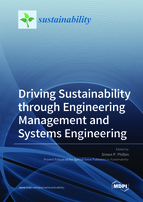Driving Sustainability through Engineering Management and Systems Engineering
A special issue of Sustainability (ISSN 2071-1050).
Deadline for manuscript submissions: closed (31 March 2021) | Viewed by 44401
Special Issue Editor
Interests: project management; engineering management; built environment; sustainability; renewable energy technologies; digital transformation
Special Issues, Collections and Topics in MDPI journals
Special Issue Information
Dear Colleague,
The COVID-19 pandemic has highlighted the somewhat precarious nature of our lives, including the way we work and our lifestyles. Efforts clearly need to be directed towards remedying this situation. However, the challenge of realizing sustainability across the triple bottom line of social, environmental, and economic development has not diminished. If anything, it is now more pressing than ever that we work towards achieving the UN Sustainable Development Goals. However, the challenges are significant. The burning of hydrocarbons continues, leading to climate change and the resulting consequences. There remain various issues associated with the adoption of renewable forms of energy. The level of urbanization is continuing to increase, as is the resulting pressure on infrastructure and transportation. The list goes on. Many of these challenges represent complex problems that require multifaceted solutions drawing on multidisciplinary approaches.
Engineering management involves the management of people and projects related to technological or engineering systems—this includes project management, engineering economy, and technology management, as well as the management and leadership of teams. Systems engineering involves the design, integration, and management of complex systems over the full life cycle—this includes requirements capture, integrated system design, as well as modelling and simulation. In addition to the theoretical underpinnings of both disciplines, they also provide a range of tools and techniques that can be employed to address technological and organizational complexity. The disciplines of engineering management and systems engineering are therefore ideally suited to help tackle both the challenges and opportunities associated with realizing a sustainable future for all.
This Special Issue of Sustainability welcomes empirical research that draws on the theory and practical application of engineering management and/or systems engineering in order to drive sustainability. The submission of articles based on multidisciplinary research studies is also encouraged.
Prof. Dr. Simon PhilbinGuest Editor
Manuscript Submission Information
Manuscripts should be submitted online at www.mdpi.com by registering and logging in to this website. Once you are registered, click here to go to the submission form. Manuscripts can be submitted until the deadline. All submissions that pass pre-check are peer-reviewed. Accepted papers will be published continuously in the journal (as soon as accepted) and will be listed together on the special issue website. Research articles, review articles as well as short communications are invited. For planned papers, a title and short abstract (about 100 words) can be sent to the Editorial Office for announcement on this website.
Submitted manuscripts should not have been published previously, nor be under consideration for publication elsewhere (except conference proceedings papers). All manuscripts are thoroughly refereed through a single-blind peer-review process. A guide for authors and other relevant information for submission of manuscripts is available on the Instructions for Authors page. Sustainability is an international peer-reviewed open access semimonthly journal published by MDPI.
Please visit the Instructions for Authors page before submitting a manuscript. The Article Processing Charge (APC) for publication in this open access journal is 2400 CHF (Swiss Francs). Submitted papers should be well formatted and use good English. Authors may use MDPI's English editing service prior to publication or during author revisions.
Keywords
- Sustainable engineering
- Sustainable Development Goals
- Infrastructure projects
- Renewable energy technologies
- Transportation systems
- Engineering management
- Systems engineering
- Project management
- Financial analysis and management
- System analysis and system dynamic modelling
- Modelling and simulation
- Technology development and innovation






